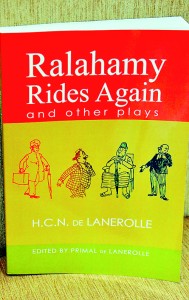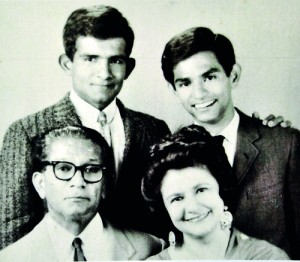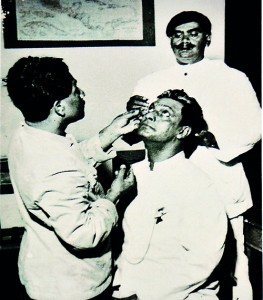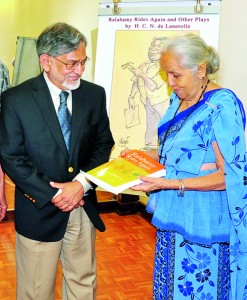Reliving those Ralahamy days
Primal de Lanerolle’s most vivid childhood memory of his father goes back to the furious clicking of his typewriter going on till early in the morning. “I remember that sound at nights when I’m grading my papers,” he smiles, describing the constant click-clack of the keys echoing through their flat down Flower Road throughout the night whenever his father ‘felt like a play’.
Almost 60 years later, the beloved characters of the Mudaliyar and Ralahamy still remain as memorable as when they were first introduced to their adoring fans on stage, this time seen in Primal’s new release “Ralahamy Rides Again and other plays” a collection of his father H.C.N. de Lanerolle’s plays.
Any Sri Lankan theatre enthusiast will tell you that plays such as “Well Mudaliyar” ,“Fifty Fifty” and the Ralahamy series are those that stand out in a genre of their own. Political satires set in Colonial Ceylon on the verge of independence and after, H.C.N. de Lanerolle’s hilariously slap in the face dramas were culturally iconic and politically complex while being bold and well ahead of their time. Known for their stylish wit and good-natured ability to poke fun at Sri Lankan politics and society, he remembers the constant stream of laughter ringing throughout performances of “Return of Ralahamy” staged at the Lionel Wendt, where an eight-year-old Primal and his brother Vasantha would sell copies of their father’s original book for five rupees.

Happy family: Duncan de Lanerolle and wife Sarah with sons Vasantha and Primal
Fondly known as “Duncan”, H.C.N. de Lanerolle had what his son calls “a memorable run”. Born in 1899 he was educated at Richmond College, Galle before receiving his Bachelor’s and Master’s degrees at Springfield College, Massachusetts. Two World Wars, the invention of the automobile and the airplane, the fall of the British Empire, and the birth of Sri Lankan independence were just a few of the many historic moments he witnessed. The pen and trusty typewriter were an extension of Duncan who was the Editorial and Circulation Manager for newspapers such as the Times of Ceylon and the Observer and spent the rest of his time writing plays before migrating to the United States.
Growing up in the de Lanerolle household was a welcoming stream of intellect, laughter, ideas and of course, theatre. With an extended family and a lively home, the young de

Duncan doing the make-up for ECB Wijeysinghe. In the background is Earle Gunawardene
Lanerolles were constantly exposed to stimulating conversation and humour aplenty. No television at that time made the brothers voracious readers and the boys were also pushed into playing sports such as rugby and cricket. “I think that the people who were in the house clearly instilled in us a sense of scholarship and interest in academics,” reflects Primal who as a youngster would stay up and listen from the staircase to the politicians, artists, writers and academics who would spend many an evening in the company of his parents.
A Professor of Physiology and Biophysics and Medicine at the University of Illinois Medical School, Primal would to an extent follow his father’s childhood dream of studying medicine, but

Those were the days: Primal presenting the book to veteran actress Iranganie Serasinghe. Pic by Mangala Weerasekera
obtained his Master’s Degree in English Literature, stemming from his obvious love for the subject and for Shakespeare.
It has taken almost three years to complete this book, and Primal admits it was no easy task. A collection of seven plays, the anthology contains favourites such as “Well Mudaliyar!” and “The Dictator” which were collaborations with E.M.W. Joseph as well as the plays written solely by the dramatist such as “Fifty Fifty”, “The Return of Ralahamy” and Ralahamy Rides Again”.
In an attempt to keep the compilation as original as possible Primal has edited very little, transcribing the pieces from his father’s original book down to Aubrey Collette’s distinctive caricatures and the playwright’s footnotes which are interesting enough to be made into their own book.
“One of the problems is there are no dates on some of the pictures and paper cuttings,” explained Primal who has included fan mail and letters received by an apparent fan- Sir John Kotelawala who enjoyed “seeing ourselves as others see us” in the politically riotous “Return of Ralahamy” and another by Lord Soulbury; the Governor General of Ceylon (1949). Other mementos include pictures of the productions on stage and behind the scenes. H.C’s casts were more or less a close knit group who he would maintain relationships with throughout his life. Notable actors of the time such as Percy Colombage, Earle Gunawardene and Waldo Sansoni and his own brother Kenneth would bring to life some of his most memorable characters while the playwright himself acted in and produced Ludowyke’s “He Comes From Jaffna”.
In 1926, a young H.C. and his friend E.C.B. Wijeyesinghe would perform a short musical comedy for the YMCA’s first carnival; an act that would go on to form a partnership of over 50 years with E.C.B. establishing his image as a renowned comedic actor and bringing to life and epitomising some of H.C.’s most celebrated characters the ‘Notary’ and the ‘Mudaliyar’.
Another important relationship that blossomed through his plays was when a young Sarah De Silva took on a role in his piece “In Council”. She would become his wife, assisting him and acting in his plays thereafter.
While H.C. provided his audiences with two to three acts of laughter and applause, the plays were those anyone could relate to and easily understood. “He understood in the 30s and 40s that language was more decisive than religion. I really have to hand it to him,” reflects Primal. His plays such as “A Wife or Two” would subtly discuss women’s rights, when the other characters reprimand the Ralahamy for wanting to educate his wife. “It’s an issue that even the US wasn’t promoting at the time,” adds Primal. The original version of “Ralahamy Rides Again” would enact a successful assassination attempt on the Ralahamy. Although it was rewritten by H.C. at the request of his wife and friends as being ‘too radical’, the country would, three years later, see its first political assassination when the country’s Prime Minister at the time S.W.R.D. Bandaranaike was shot.
The book “ Ralahamy Rides Again’ was launched at the BMICH’s Committee Room E on Friday, September 13 and will be available for sale in Sri Lanka in a few weeks’ time.


